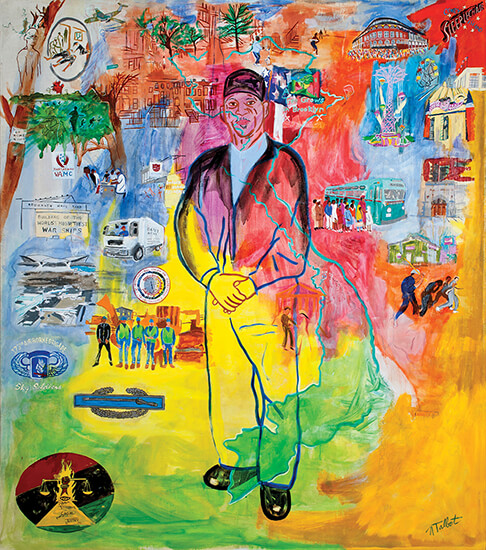
Veterans
Herbert S. J. Sweat Jr.
Vietnam, Army, 173rd Airborne Brigade
Dates of Service: 1966-1970
“I lost my soul in the killing fields.”
-Herbert Sweat
2012
"How does one recapture yourself who is a new self? When I look into the mirror I find it unjustifiable to go so far as to take life. That’s life within the killing fields – the memories for the living of those who died – it’s devastating, humiliating, degrading. I lost my soul in the killing fields.
“I was born in the Brooklyn Jewish Hospital on March 3, 1949. I grew up in Brooklyn and lived with my family at 726 Jefferson Avenue. Brooklyn was a true village. I used to walk to Ebbets Field to see the Brooklyn Dodgers. Coney Island was our ecstasy in the peak of summer. My original school was P.S. 70 on Patchin Avenue and Macon, but when I was in 3rd grade, integration came, and I was bussed by to P.S. 221 on Empire and Schenectady. I witnessed the race riots in Brooklyn in front of the Carvel ice cream store on East 53rd Street and Utica Avenue. When I went to basic training in North Carolina, it was the first time I saw separate black & white bathrooms.
"My dad was a Native American from the Shinnecock Reservation on Long Island. You will find my sisters there. My mother was from Georgia. I am a person of color who commands two cultures – I had the slave mentality from my mother’s upbringing in the south and the warrior mentality from my father.
“When I left Brooklyn for the service, I was a branch that fell off the tree that grows in Brooklyn. I was swept off the streets of Brooklyn into the hurricane of Vietnam. I felt like the enemy was trying to tell me ‘Black man- why are you fighting us when you're not free at home? Go back to Harlem, Watts, Baltimore.' There were signs in the jungle on many trees that said 'Black Man Go Home!'
“I served as an army Private in the 173rd Airborne division in Vietnam from April 1966 to October 1970. During this service, I was involved in one of the largest military operations of the war, the Tet Offensive, in January and February 1968. Eisenhower dropped more bombs during the Tet Offense there more than any other war. The C119 was the first plane that I jumped out of. Then the C142 Starlifter.
"After the war, I wanted to be an engineer. My brother was an engineer. I fought to get into the union for heavy operating engineers, Local 14BI. I worked as a truck driver for the Daily News, and went to school. I struggled to get into the union, which resulted in a discrimination suit that was handled by the Puerto Rican Legal Defense Fund. The judge wanted to award me a million dollars in 1980, but I turned it down in order to go back to training to get into the union.
"Depression came over me in 1970. I had dreams, suffered from war trauma and broke up with my second wife. Sometime later, I became homeless. I was a homeless vet for eighteen months at Martinsburg, West Virginia, in an east coast compound hospital that provided shelter to veterans. I lived in shelters until I found Black Veterans for Social Justice (BVSJ).
“At Black Veterans for Social Justice, when I talk to these veterans, these survivors, I see myself. As long as there is the code and ethics of war, there will always be war. I've dedicated myself to veterans. I use the opportunity to further develop. Veterans are preyed upon like other victims when we came back from war. We medicated ourselves and we destroyed ourselves. Vets came back and went into a closet because we didn't want to be helped. We didn't want to identify with who we were. All we want is to be home.
Herbert Sweat was interviewed by Nina Talbot in December 2012 at the offices of Black Veterans for Social Justice.